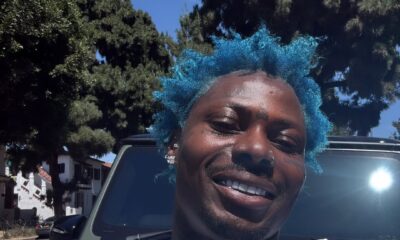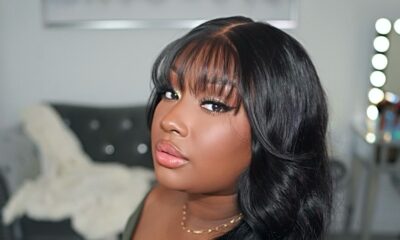Features
Latenda: Banish Your Itchy Scalp For Good! Here are 3 Causes and Solutions for the Dreadful Itch
 If you are like many black women, you have suffered from an itchy scalp at one point or another. Rampant and chronic itchiness is not only annoying, it is embarrassing. Imagine a situation where you are in public and you get an urgent desire to scratch. You might reach for a pen, stick, a comb or simply pat your head with the palm of your hands. Either way, you feel like everyone is watching and judging you, they might think you are infested or dirty. You are suddenly paranoid about your social standing and immediately look for a nearby hole in which to bury yourself. But before you make that hole a permanent home, I am here to deliver some good news. You are not alone.
If you are like many black women, you have suffered from an itchy scalp at one point or another. Rampant and chronic itchiness is not only annoying, it is embarrassing. Imagine a situation where you are in public and you get an urgent desire to scratch. You might reach for a pen, stick, a comb or simply pat your head with the palm of your hands. Either way, you feel like everyone is watching and judging you, they might think you are infested or dirty. You are suddenly paranoid about your social standing and immediately look for a nearby hole in which to bury yourself. But before you make that hole a permanent home, I am here to deliver some good news. You are not alone.Most women have suffered from this condition at one point or another especially if they wear hair extensions. But if you would like to cure your ‘tricky tickle’ forever, you must first identify what is causing it. At the outset of a healthy scalp journey, we must first understand that not all itchiness is created equal. Some of it is quite normal and harmless, but others may be an indication of a much more sinister problem.
If you are constantly scratching your head, here are a few causes and solutions to consider.
1. Dirty Hair
This is the most common reason for an itchy scalp. Some black women have a belief that the less often they wash their hair, the more it will grow. This is simply false. Black hair enjoys being washed and it benefits greatly from this ritual.
Solution: Invest in a good shampoo and conditioner preferably made of all natural products, I recommend the Cantu range. Wash your hair once a week and make sure you leave the conditioner on for at least 30 minutes. This allows for deep softening/conditioning of the hair and rinse off the conditioner with cool water – not hot. Hot water rinses off all oils from hair, which is not desirable.
2. Hair Extensions
Weaves and hair extensions can be precursors to an itchy scalp. The scalp is often pulled tight by the braids, which in itself is an irritation. There is also constant dryness, because weave wearers often go weeks without washing their hair or if they do wash their hair, they often do not dry the weave properly. This leads to an allergic reaction and in some cases causing mild mildew that occurs as a result of damp hair.
Solution: If you wear weave and suffer from the pesky itch, then you may want to wash your hair a little more frequently. I recommend that you get a shampoo by your hairdresser every two weeks. Its also a good idea to be patient with the drying process and allow at least 40 minutes underneath a hooded drier. Also rub some Tea Tree Oil into your scalp before leaving the hairdressers. Tea Tree Oil is a great topical anti-fungal and anti-bacterial agent.
If your weave is never too tight (and you wash it often) but you still suffer incessant itchiness, then it may mean that you are allergic to either all forms of foreign human hair or to the synthetic hair (Expression) that is often used to canerow the weave base. In this case, soak the synthetic hair in Apple Cider Vinegar for an hour before using it. You may also like to try other substitutes to Expression such as black wool.
3. Dandruff and seborrheic dermatitis
If you do not wear weave (and you never have momentary lapses in proper hygiene), but still constantly have an urge to scratch, scratch, scratch it may mean that you have dandruff. Dandruff is a yeast infection. Yeast is normally present on all hairy parts of the human body. But when there is too much yeast, then flaking develops. Our bodies then mount an allergic reaction to the yeast. Histamine is produced and an itch develops. This is classic dandruff as we know it. Solution: In most cases, it can be cured by an over the counter shampoo such as Head and Shoulders. Look out for shampoos that contain Selenuim, these are very helpful.
If the Dandruff persists, then you might need a stronger formulation. These are usually prescribed by a dermatologist. These shampoos are usually powerful anti-fungal agents and may be accompanied by a cortisone cream – witch deals effectively with skin inflammation caused by dandruff.
4. Psoriasis and Tinea Capitis
These may be hereditary and causes are often unknown. If you have reddish, scaly patches or round patches of hair loss that increase over time, then pay your dermatologist a visit.
I am admittedly not a doctor. So when clients walk into the salon with persistent scalp problems, I often refer them to a dermatologist. This is the most sensible way to tackle an ever present itch. Doctors are a lot more qualified in identifying allergens.
Thank you for reading. Please feel free to leave questions in the comments below so that we can fuel future articles with real life hair concerns.
Remember, it is only hair. It is far better to live a happy and joyful life. Do something everyday that fulfills you.
Latenda





















